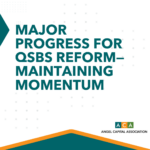In this Newsletter:
- 2025 Outlook: Republicans Look to be Aggressive with Reconciliation
- Trump Taps Kelly Loeffler for Small Business Administrator
- Post-Election Political Update: Changing Committee Landscape
- House Small Business Committee
- Senate Small Business Committee
- Senate Banking Committee
The Public Policy Quarterly Newsletter is an inside look at the latest updates, analysis, and insights into the dynamic world of U.S. federal policy and governance. In this edition, we delve into the shifting political landscape of 2025, marked by the Republican Party’s consolidated control of the White House, Senate, and House of Representatives. With reconciliation emerging as a pivotal legislative tool, we explore its implications for tax reforms, budget priorities, and immigration policies. Additionally, we highlight key cabinet appointments, including Kelly Loeffler as Small Business Administrator, and provide a detailed look at the evolving leadership of Congressional committees shaping the future of small businesses, financial regulation, and national economic policy. Join us as we navigate the priorities, challenges, and strategies driving policy decisions in Washington this year.
2025 Outlook: Republicans Look to be Aggressive with Reconciliation
By flipping the White House and Senate and retaining control of the House, Republicans are now fully in control of the Federal government and can use the powerful tool of reconciliation to help shepherd through some of their biggest budget priorities. Budget reconciliation allows for bills to pass the Senate with only 50 votes, instead of the usual 60. With Republicans holding a 53-47 Senate majority, this tool will be very useful, and Republicans will look to use this early in 2025. Reconciliation allows for expedited consideration of certain and specified changes in law to align spending, revenue, and the debt limit. While this does allow for Congress to fast-track legislation, there are some limitations. Rules that do not have a direct budgetary consequence are not allowed to be considered under reconciliation. This limitation is in place to prevent reconciliation legislation from being used as a tool for policy changes that are unrelated to the nation’s finances. Reconciliation legislation can also not make changes to Social Security. Reconciliation was used in Trump’s first term in 2017 to pass the Tax Cuts and Jobs Act.
Republicans Members of Congress and President-elect Trump will use reconciliation early in 2025 to pass tax legislation. President-elect Trump has signaled he would like to combine all measures into one large reconciliation bill. Senate Majority Leader John Thune and Speaker Mike Johnson are working with Trump to decide on if they will move forward with a single bill or two reconciliation bills to cover all issues. These tax policies will most likely include extending the 2017 Tax Cuts and Jobs Act to prevent $3.3 trillion in tax breaks from expiring at the end of 2025. The bipartisan and bicameral tax bill from 2024 did not pass after it was stalled in the Senate. This tax package included research and development tax credits crucial to small businesses, startups, and the innovation ecosystem. Republicans will also look to use the reconciliation process to pass immigration reform laws. Republican House leadership has indicated that the first 100 days of the 119th Congress will be very busy. With all House members present, the Republicans will hold a 220-215 majority, one of the smallest margins in history. However, this margin will be even smaller if Rep. Elise Stefanik (R-NY) and Rep. Mike Waltz (R-FL) get confirmed to Trump’s cabinet and with Rep. Matt Gaetz’s (R-FL) resignation. With these three seats vacant for the first few months of Congress, Republicans will not be able to lose any votes with a 217-215 majority. Although the reconciliation process greatly benefits them in the Senate, the House will still have to pass bipartisan bills.
Trump Taps Kelly Loeffler for Small Business Administrator
As the start of President-elect Donald Trump’s second term in the White House nears, his Cabinet is beginning to take shape. While the official Senate confirmation process has not started, Trump has announced his nominees for all of his top-level cabinet positions. Trump has tapped a number of his former campaign aides, strong loyalists and allies, and private sector partners to be part of his second administration. Most notable to ACA is Trump’s nominee for the Small Business Administrator: Kelly Loeffler.
Loeffler started her business career in the financial services sector with Citibank, William Blair & Company, the Crossroads Group, and Intercontinental Exchange. In 2018, she became the CEO of Bakkt, a subsidiary of Intercontinental Exchange which is a commodity and financial service provider. Bakkt is also a cryptocurrency trading platform that Trump’s Truth Social media company has been in talks to purchase. In addition to her career in the banking and financial services world, she bought a minority stake in the WNBA’s Atlanta Dream in 2010. She took an active ownership role of the team. However, she sold her stake of the team in February 201 after she was criticized for her stance on the Black Lives Matter movement. In December 2019, Georgia Governor Brian Kemp appointed Loeffler to the open Georgia Senate seat vacated by former Johnny Isakson who resigned before his term ended. Trump originally wanted Rep. Doug Collins to be appointed to the seat. Now, Collins and Loeffler will serve in Trump’s Cabinet together.
When she was sworn into the Senate, Loeffler became the second female to represent Georgia in the US Senate. According to FiveThirtyEight, Loeffler voted in line with Trump’s stated position 80% of the time. She supported efforts to repeal the Affordable Care Act, opposed abortion, and supported constructing a border wall along the Southwest Border. She served on the Health Education Labor and Pensions Committee, the Joint Economic Committee, the Committee on Veterans Affairs, and the Committee on Agriculture, Nutrition, and Forestry. She ran in 2020 to serve out the remaining two years of her term. Loeffler ran against Sen. Raphael Warnock. She lost the race in a runoff election. After her time in the Senate, Loeffler founded Greater Georgia, an organization that planned to register likely conservative voters in Georgia and expand conservative messaging.
As the Small Business Administrator, Loeffler will help Trump crack down on waste, fraud, and regulatory overreach. If confirmed by the Senate, Loeffler would lead an agency that is responsible for delivering billions in loans and disaster assistance to small businesses. Under Trump, the SBA administered the Paycheck Protection Program that helped businesses recover from the pandemic.
Post-Election Political Update: Changing Committee Landscape
The 2024 election may be over, but there is still plenty of internal jockeying to do in both the House and Senate as Members of Congress vie to win internal elections to lead their respective committees. With the Republicans retaining their slim majority, the Chairs for their committees are largely staying the same. However, the same can’t be said for their Democratic colleagues. In the aftermath of the election and a Republican sweep, many younger Democrats are looking to cast new influence on the party by challenging their older colleagues for committee leadership positions. Lets take a look at how the committees most pertinent to ACA will be governed.
House Small Business Committee
With the Republicans winning control of the House again, Rep. Roger Williams (R-TX) will remain the Chair of the House Small Business Committee. This will be his second term as Chair. Currently, Rep. Roger Williams (R-TX) is the chairman of the committee. Rep. Williams is a small business owner himself, running his family-owned car dealership and calf-cow operation, and has brought his real-world experience into his first term as committee chair. He is focused on helping businesses recover from the COVID-19 lockdowns, lowering taxes, and holding the SBA accountable. One of the committee’s main priorities is holding the SBA accountable by making sure its programs are utilized correctly and do not waste taxpayer money. The committee recently held a hearing with SBA Administrator Isabel Guzman, where Rep. Williams asked the SBA to provide more transparency for many of its programs. A Republican led committee going into 2025 would also likely help Congress extend Trump-era tax cuts, which expire at the end of 2025. The Tax Cuts and Jobs Act of 2017 allowed some business owners to deduct up to 20% of qualified business income, known as the 199(a) deduction. Taxes on new equipment purchases and other qualified assets were also temporarily cut. Small businesses benefit from the temporary income deductions for sole proprietorships, partnerships, and S-corporations. A Republican led Small Business Committee would likely help Congress pass a similar new tax package.
Senate Small Business Committee
With the Republicans flipping the Senate, Sen. Joni Ernst (R-IA) will be promoted from Committee Ranking Member to Chair. Sen. Ernst’s priorities for the committee include entrepreneurial development programs, regulatory reform, SBA budget and operation oversight, trade and exporting, and tax and finance policy. She has also prioritized holding the SBA accountable. She said the SBA is only creating opportunities for left-wing groups, and the SBA should not be interested in partisan politics. Sen. Ernest also recently introduced the Prove It Act, which was passed out of the committee. The bill would force federal agencies to demonstrate that any new regulation is compliant with existing laws and considers the indirect and direct costs placed on small businesses. Sen. Ernest wants to make sure any federal regulations on small businesses are proven before being implemented. This act would create a way for small businesses to raise concerns when regulators do not consider the costs incurred. It would also potentially exempt small businesses from the regulation altogether if it fails to comply with the review process. Sen. Ernest will look to increase SBA accountability if given the chance to chair the committee.
Senate Banking Committee
Sen. Tim Scott (R-SC) will become chairman of the powerful Senate Banking Committee. His priorities for the committee include reducing barriers to accessing credit, increasing financial inclusion, increasing access to capital formation, regulatory oversight, and protecting national and economic security. Recently, he introduced capital markets reform legislation to revitalize community businesses and open capital markets to all Americans. The Empowering Main Street in America Act would create more avenues for capital formation to create jobs and generate economic growth. Sen. Scott created this legislation after meeting with Black investors and founders and discussing ways to improve minority businesses’ access to capital. Sen. Scott also released a capital markets reform framework. This included making sure the SEC is focused on ensuring the US capital markets system works effectively instead of putting up new and burdensome barriers to opportunity. Sen. Scott believes that innovation not regulation spurs economic growth. He wants to increase opportunities for the average investor to build wealth and access new sources of capital. Sen. Scott has also been critical of the SEC’s current leadership.







